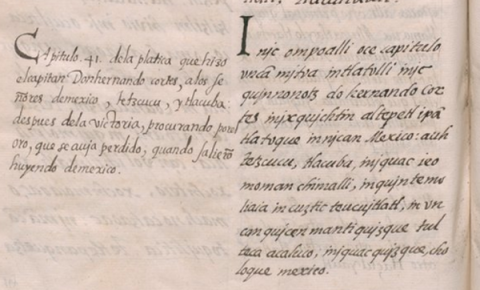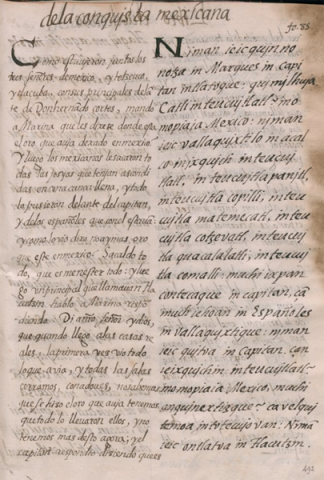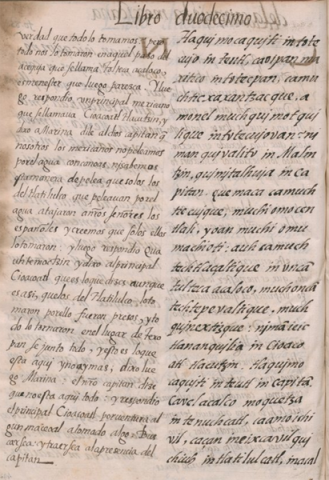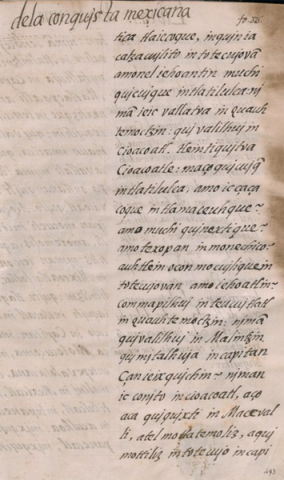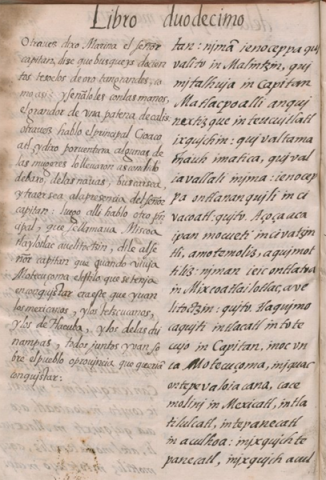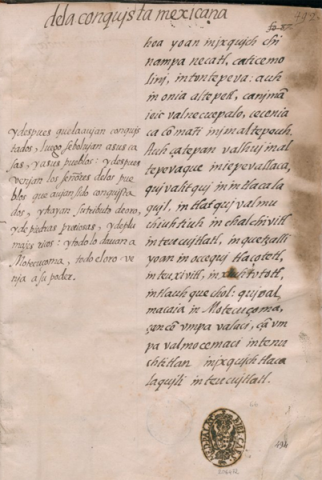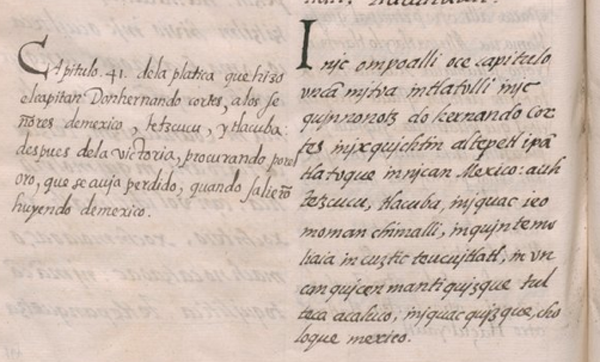 |
[Transcription of the Nahuatl (right-hand column) by James Lockhart:]
[f. 84v.] Inic ompoalli oce capitulo vncā mitoa in tlatolli inic quinnonotz do hernando Cortes in ixquichtin altepetl ipā tlatoque, in nican Mexico: auh tetzcucu, tlacuba, in iquac ic omoman chimalli, in quintemoliaia in cuztic teucuitlatl, in vncan quicenmantiquizque tultecaacaluco, in iquac quizque, choloque mexico.
----------
*TLACULIAUTL. Read “tlaçuliautl.”
|
[Translation of the Nahuatl (right-hand column) by James Lockhart:]
Forty-first chapter, where is told the speech that don Hernando Cortés gave to all the rulers in the altepetl of Mexico here, Tetzcoco, and Tlacopan, when the weapons were laid down, questioning them about the gold they had left scattered at the Tolteca canal when they came out and fled from Mexico.
[Translation of the Spanish (left-hand column) by James Lockhart:]
Chapter Forty-one, of the speech that Captain don Hernando Cortés made to the lords of Mexico, Tetzcoco, and Tacuba after the victory, seeking the gold that had been lost when they left Mexico fleeing. |
[Translation of the Nahuatl into Spanish by Fr. Bernardino de Sahagún; transcription of the Spanish (left-hand column) by James Lockhart:]
[f. 84v.] Capitulo .41. de la platica que hizo el capitan Don hernando cortes, a los señores de mexico, tetzcucu, y tlacuba: despues de la victoria, procurando por el oro, que se auia perdido, quando salierō huyendo de mexico.
|
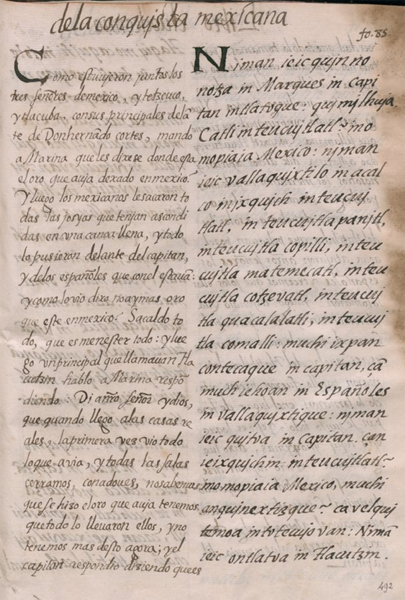 |
[Transcription of the Nahuatl (right-hand column) by James Lockhart:]
[f. 85r.] Niman ie ic quinnonotza in Marques in Capitan in tlatoque: quimilhuia. Catli in teucuitlatl? in omopiaia Mexico: niman ie ic vallaquixtilo in acalco in ixquich in teucuitlatl, in teucuitlapanitl, in teucuitlacopilli, in teucuitlamatemecatl, in teucuitlacotzevatl, in teucuitlaquacalalatli, in teucuitlacomalli: muchi ixpan contecaque in capitan, çā much iehoan in Españoles in vallaquixtique:
niman ie ic quitoa in Capitan, çan ie ixquich in in teucuitlatl? in omopiaia Mexico, muchi anquinextizque? ca vel quitemoa in totecuiovan:
Nimā ie ic ontlatoa in Tlacutzin.
|
[Translation of the Nahuatl (right-hand column) by James Lockhart:]
Then the Marqués, the Captain, spoke to the rulers, saying to them, “Where is the gold that was kept in Mexico?” Then they took out of the boats all the gold: the golden banners, the golden miters, the golden arm bands, the golden leg bands, the golden helmets, the golden disks. They laid it all before the Captain, but the Spaniards came to remove it all.
Then the Captain said, “Is this all the gold that was kept in Mexico? You are to produce it all, for our lords are seeking it urgently.”
Then Tlacotzin spoke up:
[Translation of the Spanish (left-hand column) by James Lockhart:]
When the three lords of Mexico, Tetzcoco, and Tacuba were assembled with their subordinate leaders before don Hernando Cortés, he ordered Marina to ask them where the gold was that he had left in Mexico. Then the Mexica got out for him all the precious items they had hidden in a full canoe and put it all before the Captain and the Spaniards who were with him.
When he saw it, he said, "Is there no more gold than this in Mexico? Get it all out, for it is all needed."
Then a leader named Tlacotzin spoke in answer to Marina, "Tell our lord and god that when he came to the palace the first time he saw everything that there was. We closed all the rooms with adobe bricks; we don't know what happened to the gold that was there. We believe that they took it all with them, and we have no more than this now."
The Captain answered, saying, "It is
|
[Translation of the Nahuatl into Spanish by Fr. Bernardino de Sahagún; transcription of the Spanish (left-hand column) by James Lockhart:]
[f. 85r.] Como estuuieron juntos los tres señores de mexico, y tetzcuco, y tlacuba, con sus principales delāte de Don hernādo cortes, mando a Marina que les dixese donde esta el oro que auia dexado en mexico? Y luego los mexicanos le sacaron todas las joyas que tenian ascondidas en vna canoa llena, y todo lo pusieron delante del capitan, y de los españoles que con el estauā:
y como lo vio dixo no ay mas oro que este en mexico? Sacaldo todo, que es menester todo:
y luego vn principal que llamauan Tlacutzin hablo a Marina respōdiendo: Di a n̄r̄o señor y dios, que quando llego a las casas reales, la primera vez vio todo lo que avia, y todas las salas cerramos con adoues, no sabemus que se hizo el oro que auia tenemos que todo lo lleuaron ellos, y no tenemos mas desto agora;
y el capitan respondio diziendo que es
|
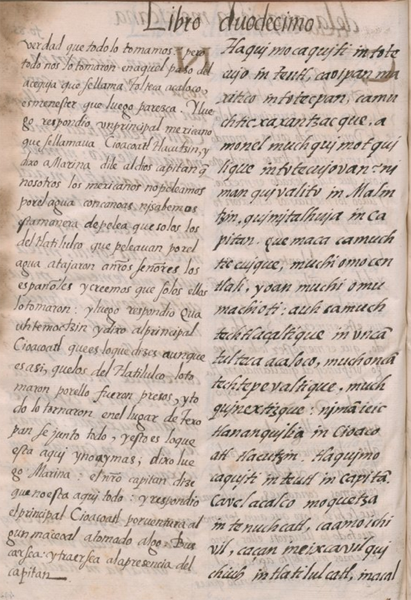 |
[Transcription of the Nahuatl (right-hand column) by James Lockhart:]
[f. 85v.] Tla quimocaquiti in totecuio in teutl, ca o ipan maxitico in totecpan, ca much ticxaxantzacque, amo nel much quimotquilique in totecuiovan?
niman quivalito in Malintzin, quimitalhuia in Capitan, Quemaca ca much ticcuique, muchi omocentlali, yoan muchi omumachioti: auh ca much techtlaçaltique in vncā tulteca acaloco, much oncā techtepevaltique, much quinextizque:
nimā ie ic tlananquilia in Cioacoatl tlacutzin, tla quimocaquiti in teutl in Capitā. Ca vel acalco moquetza in tenuchcatl, ca amo ichivil, ca çan ineixcavil quichiuh in tlatilulcatl, in acal
|
[Translation of the Nahuatl (right-hand column) by James Lockhart:]
“If our lord the god will pay heed, did our lords not take with them all that was brought to our palace when he was there, all of which was turned into bars?”
Then Marina replied, “The Captain says, ‘Yes, we took everything that was assembled, and it was stamped. But they made us let it go at the Tolteca canal, they made us drop it there. They are to produce all of it.’”
Then the Cihuacoatl Tlacotzin replied, “Let the god, the Captain, pay heed. The Tenochca stand back from boats, it is not their affair; rather the Tlatelolca took it upon themselves alone to fight in boats
[Translation of the Spanish (left-hand column) by James Lockhart:]
true that we took it all, but they took it all from us in crossing the canal called Toltecaacaloco. It is necessary that it be produced immediately."
Then a Mexica leader called Cihuacoatl Tlacotzin answered, saying to Marina, "Tell the god and captain that we Mexica do not fight on the water with canoes, nor do we understand this kind of fighting. Only the Tlatelolca who were fighting on the water intercepted our lords the Spaniards, and we believe that they alone took it."
Then Quauhtemoctzin answered, saying to the leader Cihuacoatl, "What are you saying? Although it is true that the Tlatelolca took it, they were apprehended for it and returned it all. It was all assembled in the place Texopan, and it is what is here. There is no more."
Then Marina said, "Our Captain says that it is not all here."
The leader Cihuacoatl answered, "Perhaps some macehual has taken something. It will be sought and brought into the presence of the Captain."
|
[Translation of the Nahuatl into Spanish by Fr. Bernardino de Sahagún; transcription of the Spanish (left-hand column) by James Lockhart:]
[f. 85v.] verdad que todo lo tomamos? pero todo nos lo tomaron en aquel paso del acequia que se llama Toltecaacaloco, es menester que luego parezca.
Y luego respondio vn principal mexicano que se llamaua Cioacoatl Tlacutzin, y dixo a Marina dile al dios capitan q̄ nosotros los mexicanos no peleamos por el agua con canoas ni sabemos esta manera de pelea que solos los del tlatilulco que peleauan por el agua atajaron a n̄r̄os señores los españoles y creemos que solos ellos lo tomaron:
y luego respondio Quauhtemoctzin y dixo al principal Cioacoatl que es lo que dizes aunque es asi, que los del Tlatilulco lo tomaron por ello fueron presos, y todo lo tornaron en el lugar de Texopan se junto todo, y esto es lo que esta aqui y no ay mas;
dixo luego Marina: el n̄r̄o capitan dize que no esta aqui todo:
y respondio el principal Cioacoatl por uentura algun maceoal a tomado algo. Buscarse a: y traerse a a la presencia del capitan
|
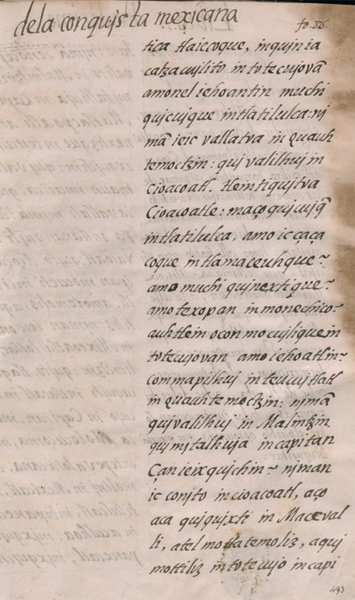 |
[Transcription of the Nahuatl (right-hand column) by James Lockhart:]
[f. 86r.] tica tlaiecoque, in quiniacatzacuilito in totecuiovā amo nel iehoantin muchi quicuique in tlatilulca:
nimā ie ic vallatoa in Quauhtemoctzin: quivalilhui in Cioacoatl, tlein tiquitoa Cioacoatle: maço quicuiq̄ in tlatilulca, amo ic çaçacoque in tlamaceuhque? amo muchi quinextique? amo texopan in monechico? auh tlein oconmocuilique in totecuiovan amo iehoatl in? commapilhui in teucuitlatl in Quauhtemoctzin:
nimā quivalilhui in Malintzin quimitalhuia in capitan Çan ie ixquich in?
niman ic conito in cioacoatl, aço aca quiquixti in Macevalli, atel motlatemoliz, aquimottiliz in totecuio in capi
|
[Translation of the Nahuatl (right-hand column) by James Lockhart:]
and to intercept our lords. Was it not perhaps the Tlatelolca who took it all?”
Then Quauhtemoctzin spoke in turn, replying to the Cihuacoatl, “What are you saying, Cihuacoatl? Although the Tlatelolca took it, were not those who took things apprehended? Did they not produce everything? Was it not collected at Texopan? And is this not what our lords took?” Quauhtemoctzin pointed to the gold with his finger.
Then Marina replied to him, “The Captain says, ‘Is this all?’”
Then the Cihuacoatl said, “Perhaps some of the common folk removed it, but it will be investigated, our lord the Captain will see it.”
[Translation of the Spanish (left-hand column) by James Lockhart:]
(intentionally blank)
|
[Translation of the Nahuatl into Spanish by Fr. Bernardino de Sahagún; transcription of the Spanish (left-hand column) by James Lockhart:]
[f. 86r., sin dibujos y sin texto en español]
|
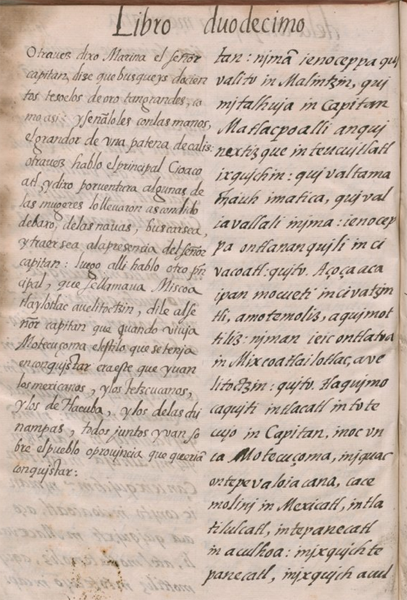 |
[Transcription of the Nahuatl (right-hand column) by James Lockhart:]
[f. 86v.] tan:
nimā ie no ceppa quivalito in Malintzin, quimitalhuia in Capitan Matlacpoalli anquinextizque in teucuitlatl ixquich in: quivaltamachiuh imatica, quivaliavallali in ima:
ie no ceppa ontlananquili in civacoatl: quito. Aço ça aca ipan mocueti in civatzintli, amotemoliz, aquimottiliz:*
niman ie ic ontlatoa in Mixcoatlailotlac, avelitoctzin: quito. tla quimocaquiti in tlacatl in totecuio in Capitan, in oc vnca Motecuçoma, in iquac ontepevaloia cana, ca cemolini in Mexicatl, in tlatilulcatl, in tepanecatl in aculhoa: in ixquich tepanecatl, in ixquich acul
----------
*AQUIMOTTILIZ. The a prefixed to some verbs here and above appears not to be a negative.
|
[Translation of the Nahuatl (right-hand column) by James Lockhart:]
Then again Marina replied, “The Captain says that you are to produce two hundred pieces of gold of this size.” She measured it with her hands, making a circle with her hands. Again the Cihuacoatl replied, saying, “Perhaps some woman put it in her skirt. It will be sought; he will see it.”
Then the Mixcoatlailotlac Ahuelitoctzin spoke up, saying, “May the lord our lord, the Captain, pay heed. When Moteucçoma was still alive, when there was a conquest somewhere, the Mexica, the Tlatelolca, the Tepaneca and the Acolhuaque all went together. All of us, all of the Tepaneca, the Acol
[Translation of the Spanish (left-hand column) by James Lockhart:]
Again Marina said, "The lord Captain says you should look for two hundred disks of gold this big," and she signaled with her hands the size of a chalice plate.
Again the leader Cihuacoatl spoke, saying, "Perhaps some of the women took it hidden underneath their skirts. It will be looked for and brought into the presence of the lord Captain."
Then another leader, named Mixcoatlailotlac Ahuelitoctzin, spoke up, saying, "Tell the lord Captain that when Moteucçoma was alive, the custom that was maintained in conquering was this: the Mexica, the Tetzcoca, the people of Tacuba, and the people of the chinampas went all together against the settlement or province that they wanted to conquer,
|
[Translation of the Nahuatl into Spanish by Fr. Bernardino de Sahagún; transcription of the Spanish (left-hand column) by James Lockhart:]
[f. 86v.] Otra uez dixo Marina el señor capitan, dize que busqueys docientos tesoelos de oro tan grandes, como asi: y señales con las manos, el grandor de vna patena de caliz:
otra uez hablo el principal Cioacoatl, y dixo por uentura algunas de las mugeres lo lleuaron ascondido debaxo, de las nauas, buscarse a, y traerse a a la presencia del sñor capitan:
luego alli hablo otro p̓ncipal, que se llamaua Miscoatlaylotlac auelitoctzin, dile al señor capitan que quando viuia Motecuçoma el estilo que se tenia en conquistar era este que yuan los mexicanos, y los tetzcucanos, y los de Tlacuba, y los de las chinampas, todos juntos yvan sobre el pueblo o prouincia que queriā conquistar:
|
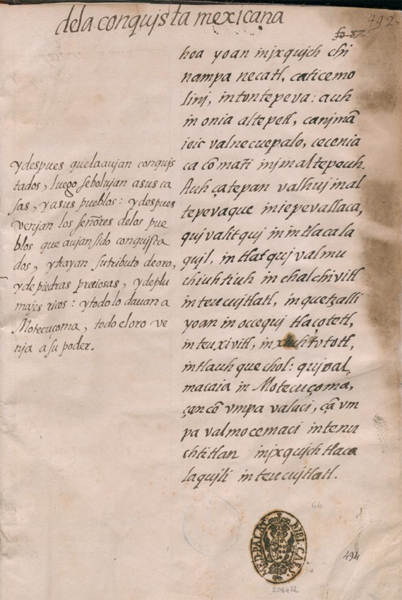 |
[Transcription of the Nahuatl (right-hand column) by James Lockhart:]
[f. 87r.] hoa yoan in ixquich chinampanecatl, ca ticemolini, in tontepeva: auh in onia altepetl, ca nimā ie ic valnecuepalo, ceceniaca cōmati in imaltepeuh. Auh çatepan valhui in altepevaque in ie pevallaca, quivalitqui in intlacalaquil, intlatqui valmuchiuhtiuh in chalchivitl in teucuitlatl, in quetzalli yoan in oc cequi tlaçotetl, in teuxivitl, in xiuhtototl, in tlauhquechol: quioalmacaia in Motecuçoma, çan cē vmpa valaci, çā vmpa valmocemaci in tenuchtitlan in ixquich tlacalaquili in teucuitlatl.
|
[Translation of the Nahuatl (right-hand column) by James Lockhart:]
huaque, and the people of the chinampas, moved together when we went to conquer, but when the altepetl fell, then everyone came back, each one heading for his own altepetl. And afterward came the people of that altepetl, the ones conquered, bringing their tribute; what they carried was greenstone, gold, precious feathers, and other precious stones, turquoise, cotinga and spoonbill feathers, and they came and gave it to Moteucçoma. It arrived all together, all the tribute and gold arrived together in Tenochtitlan."
[Translation of the Spanish (left-hand column) by James Lockhart:]
and after they had conquered it, they all went back to their homes and their settlements. Afterward came the lords of the settlements that had been conquered, bringing their tribute of gold, precious stones, and rich plumage, and they gave it all to Moteuccoma. All the gold came into his custody."
|
[Translation of the Nahuatl into Spanish by Fr. Bernardino de Sahagún; transcription of the Spanish (left-hand column) by James Lockhart:]
[f. 87r.] y despues que la auian conquistados, luego se boluian a sus casas, y a sus pueblos: y despues venian los señores de los pueblos que auian sido conquistados, y trayan su tributo de oro, y de piedras preciosas, y de plumajes ricos: y todo lo dauan a Motecuçoma, todo el oro venia a su poder.
|
